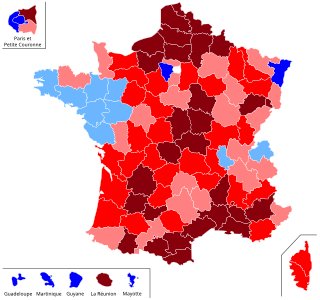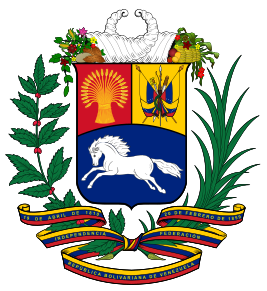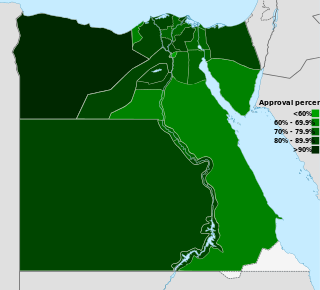The Constitution Alteration (Referendums) 1977 was an Australian referendum held in the 1977 referendums in which electors approved an amendment to the Australian constitution to allow electors in the Australian territories to vote at referendums. Electors in the territories were to be counted towards the national total, but would not be counted toward any state total.

The French referendum on the Treaty establishing a Constitution for Europe was held on 29 May 2005 to decide whether France should ratify the proposed Constitution of the European Union. The result was a victory for the "No" campaign, with 55% of voters rejecting the treaty on a turnout of 69%.

Kefaya is the unofficial moniker of the Egyptian Movement for Change, a grassroots coalition which prior to the 2011 revolution drew its support from across Egypt's political spectrum. It was a platform for protest against Hosni Mubarak's presidency and the possibility he might seek to transfer power directly to his son Gamal; political corruption and stagnation; "the blurring of the lines between power and wealth; and the regime's cruelty, coercion and disregard for human rights."

The Egyptian presidential election of 2005, held on September 7, 2005, was the first allegedly contested presidential election in Egypt's history. Hosni Mubarak, the former President of Egypt, won a fifth consecutive six-year term in office, with official results showing he won 88.6% of the vote. Mubarak's opponent, Ayman Nour, of the Tomorrow Party, is estimated to have received 7.3% of the vote and Numan Gumaa received 2.8%, however, Nour claimed that prior polling results showed over 30%. Criticism of the election process has centred on the process of selecting the eligible candidates, and on alleged election-law violations during voting. Mubarak was sworn in for his new term on September 27.

A constitutional referendum was held in Kyrgyzstan on 21 October 2007, following the constitutional crisis caused by amendments passed since the Tulip Revolution in 2005 being invalidated by the Constitutional Court of Kyrgyzstan on 14 September 2007. Voters were asked whether questions on a new constitution and electoral law. Both were approved by over 95% of voters.

A referendum on changing the electoral system to a two-round system was held in Romania on 25 November 2007, on the same date as the election to the European Parliament. The referendum was called by President Traian Băsescu on 23 October 2007 when the Parliament of Romania failed to meet a deadline set by him to pass these changes.

The 2009 referendum was a vote in which the citizens of Venezuela approved Amendment No. 1 of the Constitution of Venezuela; this abolished term limits for the offices of President, state governors, mayors and National Assembly deputies.

The 2005 Egyptian constitutional referendum took place in Egypt on 25 May 2005. The referendum was on a proposed change to the constitution of Egypt which would establish direct elections for the presidency. The opposition parties called for a boycott of the vote, which was passed by a large majority.
The Alliance for European Integration was the centre-right anti-communist ruling coalition in Moldova from the July 2009 election until it lost a no confidence vote on February 13, 2013. It was succeeded by the anti-communist Pro-European Coalition.

The Moldovan referendum of 2010 was a nationwide referendum in Moldova held on 5 September on whether or not the country should amend the Constitution of Moldova to return to direct popular election of the president. Since 2001, the president had been indirectly elected by Parliament, with a supermajority of 61 seats required for election.. The voters are asked to answer the following question "Would you agree with the Constitutional amendment, which would allow the election of the President of the Republic of Moldova by the entire population?", voting for one of the proposed options: “Yes (for)” or “No (against)”. Of those who had cast their vote, 87.83% chose "Yes". However, the referendum did not pass because only 30.29% of voters turned out, short of the necessary 33% for the referendum to be considered valid.

A constitutional referendum was held in Nauru on 27 February 2010. Voters were asked to vote on amendments to the constitution, most notably a change to a directly elected president and a strengthening of human rights legislation. A two-thirds majority was required for the amendments to pass.

A referendum to amend the Constitution of Liberia was held on 23 August 2011. Voters chose whether to ratify four amendments regarding judge tenure, elections scheduling, presidential candidate requirements and the electoral system. The National Elections Commission of Liberia (NEC) oversaw the referendum.

A constitutional referendum was held in Egypt on 19 March 2011, following the 2011 Egyptian revolution. More than 14 million (77%) were in favour, while around 4 million (23%) opposed the changes; 41% of 45 million eligible voters turned out to vote.

A constitutional referendum was held in Egypt on 14 and 15 January 2014 and with Egyptians abroad voting between 8 and 12 January. The new constitution was approved by 98.1% of voters. Turnout was 38.6%.
A referendum is a direct vote in which an entire electorate is asked to either accept or reject a particular proposal. This article summarises referendum laws and practice in various countries.

A constitutional referendum was held in Armenia on 6 December 2015. Its amendments to the constitution put the country on a course from having a semi-presidential system to being a parliamentary republic, with the changes beginning to take place during the 2017–18 electoral cycle. The referendum passed with 66.2% of voters supporting it. Voter turnout was 50.8%, passing the 33% threshold to validate the results.

A constitutional referendum was held in Italy on Sunday 4 December 2016. Voters were asked whether they approve a constitutional law that amends the Italian Constitution to reform the composition and powers of the Parliament of Italy, as well as the division of powers between the State, the regions, and administrative entities.

A constitutional referendum was held in Tajikistan on 22 May 2016. A total of 41 constitutional amendments were proposed. The changes included:

A constitutional referendum was held in Thailand on 7 August 2016. The charter offered only semi-democracy and was seen to tighten military rule in Thailand. However, it was approved by 61% of voters with a 59% turnout. A second proposal for the next Prime Minister to be jointly elected by Senators and MPs was also approved. However, the opposition groups to the constitution were barred from formally campaigning against it by the military government, while the military government actively campaigned for its adoption.

A referendum took place in Romania on 6 and 7 October 2018 regarding the definition of the family in the Romanian Constitution. The referendum asked voters whether or not they approve a change to the family's definition as provided by Article 48 of the Constitution, to prohibit same-sex marriage.



















